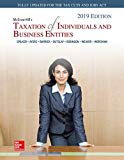
Loose Leaf for McGraw-Hill's Taxation of Individuals and Business Entities 2019 Edition
10th Edition
ISBN: 9781260189728
Author: Brian C. Spilker Professor, Benjamin C. Ayers, John Robinson Professor, Edmund Outslay Professor, Ronald G. Worsham Associate Professor, John A. Barrick Assistant Professor, Connie Weaver
Publisher: McGraw-Hill Education
expand_more
expand_more
format_list_bulleted
Question
Chapter 15, Problem 1DQ
To determine
List the most common legal entities that are used for operating a business. Discuss how these entities are similar and different for state law purposes.
Expert Solution & Answer
Explanation of Solution
The following are the most common legal entities that are used for operating a business:
- Corporations.
- Limited liability Companies (LLCs).
Partnerships .- Sole Proprietorships.
The following are the similarity of the above entities for state law purposes:
- The state laws protect all the members or owners of Corporations and LLCs from personal legal entities.
- Corporations, Limited liability Companies (LLCs), and Partnerships are identified as business entities for state law purposes.
The following are the differences among the above entities for state law purposes:
- The legal rights and responsibilities, and number of owners of each entity are different from other.
- The tax rule to determine tax on the entities and their owners are different from each other.
Want to see more full solutions like this?
Subscribe now to access step-by-step solutions to millions of textbook problems written by subject matter experts!
Students have asked these similar questions
Hello teacher find correct answer
financial accounting answ
choose best answer me
Chapter 15 Solutions
Loose Leaf for McGraw-Hill's Taxation of Individuals and Business Entities 2019 Edition
Knowledge Booster
Similar questions
arrow_back_ios
SEE MORE QUESTIONS
arrow_forward_ios
Recommended textbooks for you
- Century 21 Accounting Multicolumn JournalAccountingISBN:9781337679503Author:GilbertsonPublisher:Cengage
 Individual Income TaxesAccountingISBN:9780357109731Author:HoffmanPublisher:CENGAGE LEARNING - CONSIGNMENT
Individual Income TaxesAccountingISBN:9780357109731Author:HoffmanPublisher:CENGAGE LEARNING - CONSIGNMENT

Century 21 Accounting Multicolumn Journal
Accounting
ISBN:9781337679503
Author:Gilbertson
Publisher:Cengage


Individual Income Taxes
Accounting
ISBN:9780357109731
Author:Hoffman
Publisher:CENGAGE LEARNING - CONSIGNMENT


